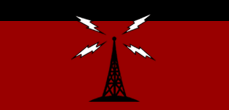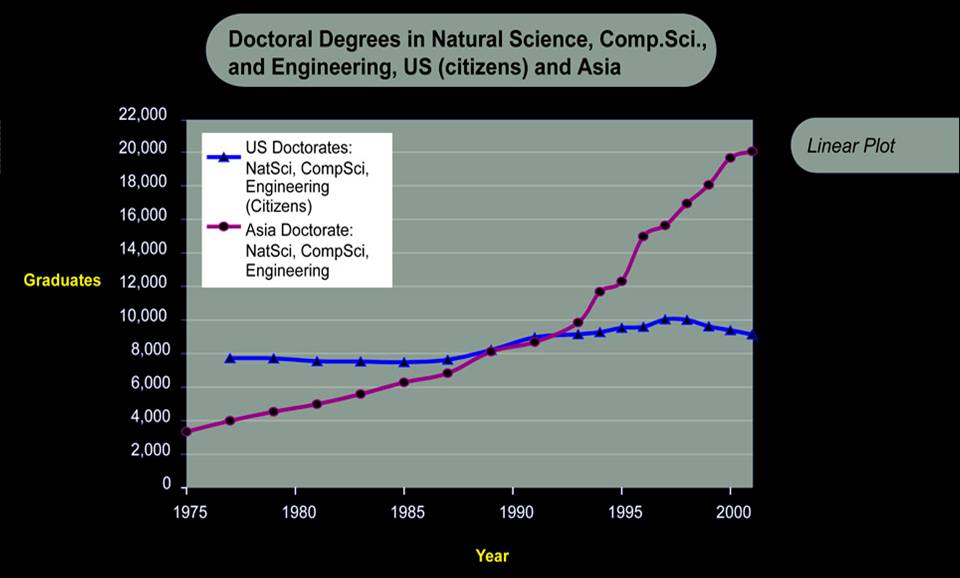 |
 |
September 02, 2005YES, I'M BLOGGING ABOUT SOME OTHER STUFF, but don't think that gets you off the hook if you haven't donated to Katrina relief! Go here and give somebody some money. And if you've contributed, but haven't logged your contribution over at N.Z. Bear's place, and I'll bet that's most of you, well, go do it. RAY KURZWEIL: The InstaPundit Interview I've written before about Ray Kurzweil's new book, The Singularity Is Near : When Humans Transcend Biology, GHR: Your book is called "The Singularity is Near" and -- as an amusing photo makes clear -- you're spoofing those "The End is Near" characters from the New Yorker cartoons. For the benefit of those who aren't familiar with the topic, or who may have heard other definitions, what is your definition of "The Singularity?" And is it the end? Or a beginning? RK: In chapter 1 of the book, I define the Singularity this way: “a future period during which the pace of technological change will be so rapid, its impact so deep, that human life will be irreversibly transformed. Although neither utopian nor dystopian, this epoch will transform the concepts that we rely on to give meaning to our lives, from our business models to the cycle of human life, including death itself. Understanding the singularity will alter our perspective on the significance of our past and the ramifications for our future. To truly understand it inherently changes one’s view of life in general and one’s own particular life. I regard someone who understands the Singularity and who has reflected on its implications for his or her own life as a ‘singularitarian.’” The Singularity is a transition, but to appreciate its importance, one needs to understand the nature of exponential growth. On the one hand, exponential growth is smooth with no discontinuities, and values remains finite. On the other hand, it is explosive once we reach the “knee of the curve.” The difference between what I refer to as the “intuitive linear” view and the historically correct exponential view is crucial, and I discuss my “law of accelerating returns” in detail in the first two chapters. It is remarkable to me how many otherwise thoughtful observers fail to understand that progress is exponential, not linear. This failure underlies the common “criticism from incredulity” that I discuss at the beginning of the “Response to Critics” chapter. To describe these changes further, within a quarter century, nonbiological intelligence will match the range and subtlety of human intelligence. It will then soar past it because of the continuing acceleration of information-based technologies, as well as the ability of machines to instantly share their knowledge. Intelligent nanorobots will be deeply integrated in our bodies, our brains, and our environment, overcoming pollution and poverty, providing vastly extended longevity, full-immersion virtual reality incorporating all of the senses, “experience beaming,” and vastly enhanced human intelligence. The result will be an intimate merger between the technology-creating species and the technological evolutionary process it spawned. But all of this is just the precursor to the Singularity. Nonbiological intelligence will have access to its own design and will be able to improve itself in an increasingly rapid redesign cycle. We’ll get to a point where technical progress will be so fast that unenhanced human intelligence will be unable to follow it. That will mark the Singularity.
RK: I’ve consistently set 2029 as the date that we will create Turing test-capable machines. We can break this projection down into hardware and software requirements. In the book, I show how we need about 10 quadrillion (1016) calculations per second (cps) to provide a functional equivalent to all the regions of the brain. Some estimates are lower than this by a factor of 100. Supercomputers are already at 100 trillion (1014) cps, and will hit 1016 cps around the end of this decade. Two Japanese efforts targeting 10 quadrillion cps around the end of the decade are already on the drawing board. By 2020, 10 quadrillion cps will be available for around $1,000. Achieving the hardware requirement was controversial when my last book on this topic, The Age of Spiritual Machines, came out in 1999, but is now pretty much of a mainstream view among informed observers. Now the controversy is focused on the algorithms. To understand the principles of human intelligence, that is to achieve the software designs, we need to reverse-engineer the human brain. Here, progress is far greater than most people realize. The spatial and temporal (time) resolution of brain scanning is also progressing at an exponential rate, roughly doubling each year, like most everything else having to do with information. Just recently, scanning tools can see individual interneuronal connections, and watch them fire in real time. Already, we have mathematical models and simulations of a couple dozen regions of the brain, including the cerebellum, which comprises more than half the neurons in the brain. IBM is now creating a simulation of about 10,000 cortical neurons, including tens of millions of connections. The first version will simulate the electrical activity, and a future version will also simulate the relevant chemical activity. By the mid 2020s, it’s conservative to conclude that we will have effective models for all of the brain. So at this point, we’ll have a full understanding of the methods of the human brain, which will expand the toolkit of techniques we can apply to create artificial intelligence. We will then be able to create nonbiological systems that match human intelligence in the ways that humans are now superior, for example, our pattern- recognition abilities. These superintelligent computers will also be able to do things we are not able to do, such as share knowledge and skills at electronic speeds. By 2030, a thousand dollars of computation will be about a thousand times more powerful than a human brain. Keep in mind also that computers will not be organized as discrete objects as they are today. There will be a web of computing deeply integrated into the environment, our bodies and brains. Achieving Turing test-capable nonbiological intelligence will be an important milestone, but this is not the Singularity. This is just creating more human-level intelligence. We already have billions of examples of human-level intelligence. Of course, there will be enormous benefits of machine intelligence with human level capabilities in that machines will be able to combine the now complimentary strengths of human and machine intelligence. Our biological thinking takes place at chemical gradient speeds of a few hundred feet per second, millions of times slower than electronics. And our communication speeds are at the speed of human language, again millions of times slower than what machines are capable of. Of course, our language ability has been very important – other animal species don’t have species-wide knowledge bases at all, let alone exponentially expanding ones, and the ability to share them. In terms of signposts, credible reports of computer passing the full Turing test will be a very important one, and that signpost will be preceded by non-credible reports of successful Turing tests. A key insight here is that the nonbiological portion of our intelligence will expand exponentially whereas our biological thinking is effectively fixed. When we get the mid 2040s, according to my models the nonbiological portion of our civilization’s thinking ability will be billions of times greater than the biological portion. Now that represents a profound change. The term “Singularity” in my book and by the Singularity aware community is comparable to the use of this term by the physics community. Just as we find it hard to see beyond the event horizon of a black hole, we also find it difficult to see beyond the event horizon of the historical Singularity. How can we, with our limited biological brains, imagine what our future civilization, with its intelligence multiplied billions and ultimately trillions of trillions fold, be capable of thinking and doing? Nevertheless, just as we can draw conclusions about the nature of black holes through our conceptual thinking, despite never having actually been inside one, our thinking today is powerful enough to have meaningful insights into the implications of the Singularity. That’s what I’ve tried to do in this book.
RK: This is a clever – and important – question, which has different aspects to it. One aspect is what is the relationship between intelligence and power? Does power result from intelligence? It would seem that there are many counterexamples. But to piece this apart, we first need to distinguish between cleverness and true intelligence. Some people are clever or skillful in certain ways but have judgement lapses that undermine their own effectiveness. So their overall intelligence is muted. We also need to clarify the concept of power as there are different ways to be powerful. The poet laureate may not have much impact on interest rates (although conceivably a suitably pointed poem might affect public opinion), but s/he does have influence in the world of poetry. The kids who hung out on Bronx street corners some decades back also had limited impact on geopolitical issues, but they did play an influential role in the creation of the hip hop cultural movement with their invention of break dancing. Can you name the German patent clerk who wrote down his day dreams (mental experiments) on the nature of time and space? How powerful did he turn out to be in the world of ideas, as well as on the world of geopolitics? On the other hand, can you name the wealthiest person at that time? Or the U.S. Secretary of State in 1905? Or even the President of the U.S.? Another important point is that it is possible to put power in the bank, so to speak. Of course, we can literally put money in the bank, and money is power. It generally takes intelligence to create power in the first place – again keeping in mind that there are different types of power. So one can use one’s intelligence to make money and then put it in the bank. Or one can use one’s intelligence to become a famous poet or a famous rap artist, and then people will listen to your next creation based on your past laurels. Such stored power can be maintained by organizations as well as individuals – the power of a company or a nation, for example. It takes intelligence to create the power – any kind of power – in the first place, but it can then be stored. But a lack of intelligence will cause that power to dissipate, not instantly, but over time it will act like a slow leak. An organization may have as its nominal leader someone who may not be especially intelligent, but there may nonetheless be intelligence around that person. But if the organization truly lacks intelligence, and acts foolishly, it will lose its store of power over time. A study of history will show that the technologically more sophisticated (and we can certainly consider technology to be a manifestation of intelligence) civilization prevails. The rise of India and China in recent history is certainly a manifestation of the intelligence and education of their citizens (more on that later). Israel has little land and no significant natural resources, yet its gross national product is now several times that of Saudi Arabia due to the education and technological sophistication of its citizens. In short, it is my view that ultimately intelligence prevails, even though the ability to save and store it acts as a “low pass filter,” to use an engineering term. The other interesting aspect of your question has to do with the whole promise versus peril question. The promise side of the equation is the opportunity for these accelerating technologies to advance complexity, where complexity is meaningful knowledge including all of the arts and sciences, as well as human skills. To take an extreme example of what you refer to as power without intelligence, gray goo certainly represents power – destructive power – and if such an existential threat were to prevail, it would represent a catastrophic loss of complexity. It would be a triumph of raw power over intelligence. A ten megaton warhead is similar. Note that in such scenarios, the power that might succeed over intelligence is invariably a destructive power. Now I have been accused of being an optimist on these questions, and I think that accusation has merit. On the other hand, I was also the person that alerted Bill Joy to the dangers of technology, which started with our discussion in a Lake Tahoe bar room in September of 1998. And it would not at all be accurate to say that I am sanguine or dismissive about these dangers. I address them in some detail in chapter 8 of Singularity is Near as you know. We have an existential threat now in the form of the possibility of a bioengineered malevolent biological virus. With all the talk of bioterrorism, the possibility of a bioengineered bioterrorism agent gets little and inadequate attention. The tools and knowledge to create a bioengineered pathogen are more widespread than the tools and knowledge to create an atomic weapon, yet it could be far more destructive. I’m on the Army Science Advisory Group (a board of five people who advise the Army on science and technology), and the Army is the institution responsible for the nation’s bioterrorism protection. Without revealing anything confidential, I can say that there is acute awareness of these dangers, but there is neither the funding nor national priority to address them in an adequate way. The answer is not relinquishment of these advanced technologies as I argue in the chapter because in addition to depriving humankind of the profound benefits (such as effective treatments for cancer, heart disease and other diseases), it would actually make the dangers worse by driving these technologies underground where responsible practitioners would not have easy access to the tools to develop the defenses. The real answer is to put more stones on the defensive side of the scale. Along these lines, I’ve testified to Congress (http://www.kurzweilai.net/meme/frame.html?main=/articles/art0556.html) on my proposal for a “Manhattan” style project to quickly develop a quick response system for new biological viruses, whether human-made or natural. For example, we could put in place a system which would quickly sequence a new virus, create an RNAi (RNA interference) medication for it (RNAi has shown to be effective to combat a specific biological virus because almost all biological viruses use messenger RNA which RNAi blocks), and then rapidly build up production. In this testimony I also address similar issues for nanotechnology, which are still a couple of decades away. The response of some other observers, such as Richard Smalley, is to just deny that such dangers as self-replicating nanotechnology are feasible. As I point out in the book, he has made this motivation explicit. And although the existential nanotechnology danger is not yet at hand, denial is not the appropriate strategy. So, yes, it is possible for the destructive (complexity destroying) powers represented by one of the existential threats I discuss in chapter 8 to prevail. I’m optimistic that they won’t, but less optimistic that we can avoid all painful events. Technology accelerated smoothly through the twentieth (and all prior) centuries, but we certainly didn’t avoid painful episodes.
RK: Arguably we already have powers comparable to the Greek gods, albeit, as you point out, piddling ones compared to what is to come. For example, you are able to write ideas in your blog and instantly communicate them to just those people who are interested. We have many ways of communicating our thoughts to precisely those persons around the world with whom we wish to share ideas. If you want to acquire an antique plate with a certain inscription, you have a good chance of quickly finding the person who has it. We have increasingly rapid access to our exponentially growing human knowledge base. Human egocentrism, greed, jealousy, and other emotions that emerged from our evolution in much smaller clans has nonetheless not prevented the smooth, exponential growth of knowledge and technology through the centuries. So I don’t see these emotional limitations halting the ongoing progression of technology. Adaptation to new technologies does not occur by old technologies suddenly disappearing. The old paradigms persist while new ones take root quickly. A great deal of economic commerce, for example, now transcends national boundaries, but the boundaries are still there, even if now less significant. But there is reason for believing we will be in a position to do better than in times past. One important upcoming development will be the reverse-engineering of the human brain. In addition to giving us the principles of operation of human intelligence that will expand our AI tool kit, it will also give us unprecedented insight into ourselves. As we merge with our technology, and as the nonbiological portion of our intelligence begins to predominate in the 2030s, we will have the opportunity to apply our intelligence to improving on – redesigning – these primitive aspects of it.
RK: If the computational substrate that manifests our intelligence later in this century becomes taken over by scans and spambots, that would represent an existential failure, comparable to the triumph of a bioengineered biological virus or gray goo. We already have a complex ecology in the substrate represented today by our computers and the Internet. But we don’t see self-replicating software entities dominating and crowding out useful complexity. With regard to science fiction, it should be pointed out that the science fiction/futurism movies of the most recent decade often represent the written science fiction of a couple of decades earlier. Most science futurism movies make the mistake of taking one future change and applying that to today’s world as if nothing else will change. For example, the movie AI depicts near human-level cyborgs, but everything else from the coffee maker to the cars are essentially unchanged. The Matrix movies, although dystopian as is common among science futurism films, do provide a somewhat more comprehensive view of the future nature of virtual reality. It is difficult for the science fiction genre to deal effectively with the many diverse changes that a realistic depiction of the future would entail. It would require explaining a panoply of changes. It is easier for a writer to concentrate on the literary challenges of one type of change while being able to lean on an otherwise familiar landscape to create the needed human drama. One science fiction writer who has made effective attempts at depicting the many profound changes that lie ahead is Cory Doctorow. His novel usr/bin/god (which I discuss on pages 271-272) depicts a genetic algorithm that evolves a Turing test-capable AI. The evaluation function is to send each AI program out to interact in chat rooms and determine how long each system can last without being challenged by one of the human participants with a statement like, “what are you, a bot, or something?” This is an interesting idea and may be a good way of finishing the strong AI project once we get close.
RK: In essence, The Singularity will be an explosion of human knowledge made possible by the amplification of our intelligence through its merger with its exponentially growing variant. Creating knowledge requires passion, so one piece of advice would be to follow your passion. That having been said, we need to keep in mind that the cutting edge of the GNR revolutions is science and technology. So individuals need to be science and computer literate. And societies need to emphasize science and engineering education and training. Along these lines, there is reason for concern in the U.S. I’ve attached seven charts I’ve put together (that you’re welcome to use) that show some disturbing trends. Bachelor degrees in engineering in the U.S. were 70,000 per year in 1985, but have dwindled to around 53,000 in 2000. In China, the numbers were comparable in 1985 but have soared to 220,000 in 2000, and have continued to rise since then. We see the same trend comparison in all other technological fields including computer science and the natural sciences. We see the same trends in other Asian countries such as Japan, Korea, and India (India is not shown in these graphs). We also see the same trends on the doctoral level as well. One counterpoint one could make is that the U.S. leads in the application of technology. Our musicians and artists, for example, are very sophisticated in the use of computers. If you go to the NAMM (National Association of Music Merchants) convention, it looks and reads like a computer conference. I spoke recently to the American Library Association, and the presentations were all about data bases and search tools. Essentially every conference I speak at, although diverse in topic, look and read like computer conferences. But there is an urgent need in our country to attract more young
people to science and engineering. We need to make these topics cool
and compelling. Graphics:
PATTERICO: "The Los Angeles Times Once Again Edits the Truth Out of a Wire Story." THE FEDERAL RESERVE on Katrina. (Via NewsAlert). READER ELIZABETH KING EMAILS:
I've always admired power workers, and their sense of mission after disasters. UPDATE: Reader Lee Lowrey emails:
We'll start to see rapid progress by next week, I imagine, though it'll be months before things are set right, given the scale of the devastation. STEPPING UP: I mentioned earlier that Amazon has a donation link on its page, and Yahoo. So does Google, and reader Michael Pierce emails: "Apple iTunes store is accepting donations for the American Red Cross - and not taking any cut from the transaction." Bravo. HUGH HEWITT is trying something new for disaster relief.
I think this means that we'll have plenty of oil, if somewhat more
expensively, to last until we switch to something better. That's why,
as I've said before, the "Peak Oil" analysis is, at most, "Peak Cheap
Oil." And it may well be that, once started, the cost of extracting
this stuff will fall significantly. (Via NewsAlert). READER ROGER ARANGO says that we shouldn't be criticizing the efforts of New Orleans or the federal authorities:
Well, it could have been worse, certainly. I do think that a firmer hand with looters early on, in line with "broken windows" theory, might have forestalled the more egregious lawlessness we're seeing now. But this is a natural disaster without parallel in American history -- like the Chicago Fire if it had spread across three states -- and disaster relief isn't like calling Domino's. Nor does the fact that we're Americans somehow offer supernatural protection from the consequences of a calamity like this. Bridges are out, roads are blocked, boats are sunk, and all sorts of other infrastructure is down. Aid can't get through in quantity until that's fixed, at least somewhat. In a situation like this, the first week you get a trickle, the second week you get enough, and the third week you get pretty much all you want. We're still in week one. That, as I've noted elsewhere, is why the standard disaster-preparation advice is to have enough food and water to get you through a week on your own. Meanwhile, it's interesting to see Bill Clinton slamming CNN for second-guessing and nitpicking. My own take: Some of the nitpicking and complaining may well be justified, even beyond the inevitable dropped balls in something like this. But there will be plenty of time for that later. Right now, people should be focusing on constructive action, not point-scoring. UPDATE: On the other hand, Free Will Blog, which was defending Nagin the other day, has turned critic, noting that the breakdown in law and order is a major holdup for rescue efforts. INTERESTING that they're releasing this information on the Friday before Labor Day:
I've been counting on Tom Maguire and Ed Morrissey to keep me up on this whole Able Danger thing. I expect that they'll have more to say on it as the weekend continues. September 01, 2005ARTHUR CHRENKOFF has a collection of hurricane exploitation quotes. FLOOD AID UPDATE: Here are some places you can donate to hurricane Katrina relief: (Bumped to top -- scroll down for the latest posts, which continue to be added below this one.) [LATER: First blogburst installment is up -- scroll down to see the links.] [LATER STILL: There's lots more, now.] LATER: Don't forget to log your contribution over at N.Z. Bear's. Sorry -- I missed that earlier or I would have noted it sooner. By the way, people want to know where I gave. I donated $500 to the Salvation Army, whose work I've respected. I'm also going to donate some money to help some folks who have wound up here, as soon as I figure out where to send the money. Oh, and the Mercy Corps ad is a freebie, via something Henry Copeland is doing. Catholic Charities is involved, and probably has lots of resources to draw on in the heavily Catholic New Orleans area. Austin Bay is recommending Episcopal Relief and Development. Liz at Rightalk suggests that animal lovers donate to the Humane Society. Here's a link to Mennonite Disaster Services. The Sanity Inspector says they're highly efficient. Reader Peter Viditto recommends The Mercy Corps Here's the link for Methodist Relief. Lisa Larkin recommends Operation Blessing. The Salvation Army does good work. (WalMart just gave them a million dollars, but that's just the barest beginning of what's needed.) Hugh Hewitt recommends Samaritan's Purse Scott Ott recommends Southern Baptist Disaster Relief. Numerous readers recommend United Jewish Charities. Here's a link to LDS Humanitarian Services. Soldiers' Angels has a special relief fund to benefit returning servicepeople in the disaster area. Blog-based charity Strengthen The Good is setting up a donation matching program. I'll keep updating this as I get new suggestions. Jay Allen has a further suggestion:
Not bad -- if your employer is supporting this. Chuck Simmins is tracking corporate donations. Here's the link for N.Z. Bear's Katrina relief aggregator page. Here's FEMA's list of recommended charities. More charitable links at Little Green Footballs. Walmart has set up a Community Crisis System that lets people post messages to, and read messages from loved ones. (Actual page is here.) Mike Krempasky says that
Cool. Lefty blogger Skippy has donated, and is issuing a challenge to bloggers left and right. "this is not about red states v. blue states...this is not about left v. right...this is not about liberal v. conservative... the people in louisiana, mississippi and alabama are americans. this is about america. and americans have historically always rolled up their sleeves and pitched in to help out their fellow countrymen in need." Amen. Even the capitals-impaired ones! Craigslist New Orleans has offers of housing for Katrina refugees. UPDATE: The plan for tomorrow's flood-aid blogburst: I'd like each blogger participating to put up a post recommending a charity, or other action to help, and linking back to this post where I'll keep a comprehensive list of both bloggers and charities. Basically, a Carnival of Hurricane Relief. That way readers of any blog will have ready access to recommendations on all the blogs. If anyone has a better idea, let me know. Be sure to send me a link to your post, so that I can link it here. Put "Katrina Flood Aid" in the subject line. LATER: Please don't send any more links! I woke up this morning (Thursday) and my mailbox is jammed. I don't know how I'll post all of these, but I'll figure something out, I guess. LATER STILL: Bring 'em on! My morning and afternoon appointments are cancelled, yesterday's migraine is pretty much gone, and John Tabin has volunteered to help, so send your links. FIRST INSTALLMENT Okay it's not tomorrow yet -- except in China, as GZExpat reminded me -- but this stuff is pouring in and I think I'd better get a head start so that I'll have time to teach my classes and such on Thursday. Here's the first batch of links, with more to follow: Ah, Shoot! suggests Lutheran World Relief and Lutheran Disaster Response. American Geek suggests UMC Disaster Relief. Anklebiting Pundits recommend The Mercy Corps. Arabie suggests the Red Cross. There's also information on how to get aid from them if you need it. La Shawn Barber recommends the Salvation Army. Michael Barone picks the Salvation Army. Below the Beltway suggests Catholic Charities. Domenico Bettinelli has multiple suggestions. California Conservative recommends the American Red Cross. Eric Cowperthwaite suggests the Red Cross and the United Way. Mark DeForrest has multiple recommendations. The Eclectic Econoclast recommends the Canadian Red Cross to Canadians wanting to give. The Gospel Messenger recommends Church World Service. GZ Expat suggests Lutheran World Relief and Catholic Charities. Hugh Hewitt is donating to the Canal Street Presbyterian Church in New Orleans. Greg Hlatky recommends the American Kennel Club's Canine Relief Fund for lost or abandoned dogs. Kenny, Karina & Jacob's Adventures in Deutschland recommends Samaritan's Purse. Life of Rubin suggests Chabad of Louisiana. Mark LaRoi suggests Feed the Children. Left Brain Female recommends Operation Blessing. Rick Lippincott recommends the Armed Forces Retirement Home in Gulfport, MS, which took a beating. Lump on a Blog recommends Second Harvest. Mr. Spkr recommends Feed the Children. The New Editor has multiple suggestions. No Government Cheese suggests the Atlanta Red Cross. Bill Quick recommends the Salvation Army. The Ringleader has multiple suggestions. Tim Russo recommends multiple charities. Ruthie in the Sky says give to any approved charity. Soapbox Politics suggests multiple charities. Mark Steyn is endorsing the Mercy Corps -- and pledging revenues from book sales via his site, too. "Don't worry, it's not one of these dodgy deals involving an unstated 'portion of profits.' You get the book, Mercy Corps get the full US$19.95." Taxable Talk recommends the Salvation Army and United Jewish Charities. Traffic Circles suggests Nazarene Compassionate Ministries. Uzzman recommends the Mercy Corps. Sissy Willis recommends the AHA/Animal Rescue League effort. SECOND INSTALLMENT: Okay, I'm totally overwhelmed with "Katrina Flood Aid" emails -- there are hundreds and hundreds. I'm going to keep posting as the day goes on, but no fancy alphabetical order or clever comments. And I'm not repeatedly linking to the same charities; I'll just mention 'em. There are just too many! Kathy Kinsley has taken up Skppy's challenge and donated to the Salvation Army. Laughing Wolf and Babalu Blog are offering gifts to people who donate. Bloggledygook has a wide range of charities, some not listed above. Baseball Musings is giving to the Salvation Army, the Mennonite Disaster Relief folks, and the Humane Society. Betsy Newmark is endorsing the Red Cross and Feed the Children. SgtStryker.Com recommends Lutheran World Relief and the Salvation Army. Michele Catalano has a lot of links, and emails: "Side note: I'm also trying to find anyone with contacts in the shipping industry who can help me get a truck/transport donated - I'm going to start a local drive for school supplies to be sent to both the Astrodome and Baton Rouge for displaced kids who will be transferring to schools near their shelters." Let her know if you can help. Dodgeblog is supporting the American Red Cross. Damian Penny recommends the Canadian Red Cross, and has another post with charities accepting donations from Canadians. William Teach is supporting the American Red Cross. Ed Morrissey is supporting Catholic Charities and has some other thoughts. PowerPundit recommends the Salvation Army. Brendan Loy is going with the Salvation Army. David Gerstman recommends the Orthodox Union Hurricane Katrina Relief Fund. Baldilocks recommends Soldiers' Angels. Teak Talks is giving to the Craft Emergency Relief Fund, which helps craftspeople in trouble. DLMSY recommends Americares. Annika recommends Catholic Charities. HiWired's corporate blog has joined the fund and recommends several charities. Free Money Finance,/a> is matching reader donations. Five Cent Nickel lists numerous charities. Back Seat Drivers recommends Chabad New Orleans. Jeff Quinton recommends the Salvation Army, and notes that Wizbang has its own effort underway. Ed Cone is endorsing the Red Cross. Pejman Yousefzadeh is endorsing United Jewish Communities. Blonde Sagacity recommends the Red Cross. She's got pictures, too. Juan Paxety supports the Salvation Army, and challenges musicians and music lovers. " Just as New York and Chicago were great melting pots for America, so was New Orleans. It melted together the musical traditions of France, England, Africa, and Spain and created a uniquely American music - the first world music." Scrappleface is recommending Southern Baptist Disaster Relief. John Tabin recommends the Union for Reform Judaism's Hurricane Relief Fund. Rachel at TinkertyTonk recommends the Salvation Army. WorldViews has numerous links, for now and for the aftermath. Samantha Pierce has multiple recommendations, and suggests ministrywatch as a tool for checking out religious charities. The Fat Guy is supporting the Salvation Army, and is offering free RV hookups at his park in Texas. More via John Tabin -- thanks, John! Alan at Petrified Truth recommends Houston Food Bank. Jim Dunn at Southern Appeal recommends The Best Friends Animal Society. Posse Incitatus recommends Catholic Charities and notes that "a few Hail Marys can't hurt, either." Aliens in This World endorse Catholic Charities. Brian Warbiany will match up to $100 for a reputable charity to be chosen by the first reader to respond. Witch of the Dogs supports The Humane Society of Northwest Louisiana. Jack Garber, Director of Member Services for Christian Service Charities, emails to note the relief efforts of several CSC member charitiess. Elephant in Exile has several recommendations. Michelle Malkin likes Mercy Corps. Along the Tracks recommends Lutheran Services in America and notes that Thrivent Financial for Lutherans will match member donations. Jeremy Dibbell has a couple of recommendations. Ed Brenegar supports Presbyterian Disaster Assistance. Area417 has multiple recommendations. The American Princess has many suggestions. Pajamasphere suggests contacting your alumni association or other membership group, as personal assistance to an old friend can often go beyond what a charity does. Matthew Eppinette recommends the Southern Baptist Disaster Relief Fund. Jason Clarke points to a blogger in New Orleans collecting for herself and others. The Dummocrats choose the Brett Favre Fourward Foundation. CaribPundit endorses LCMS World Relief. Ipsissima Verba recommends Catholic Charities. Cadmusings likes International Disaster Emergency Service. Still more, via John Tabin's fiance, Sara DelVillano. Thanks Sara! Sundries recommends several charities. My Side of the Puddle supports The Red Cross. GM's Corner. recommends Operation USA. Tim Sisk suggests The United Methodist Committee on Relief. The Blog from the Core recommends Catholic Charities. The Disgruntled Chemist supports Network for Good. PoliBlog; suggests Habitat for Humanity. The Musings of Kev supports several charities. Ella M. links to many charities. Hyscience; supports many worthy charities. The Fast Squirrel recommends Samaritan's Purse. FullosseousFlap; recommends Catholic Charities. USS Neverdock supports The Red Cross. Matthew Maynard supports Feed The Children. Nancy at My Garden Spot recommends The Harris County Citizen Corps. Brent Colbert links to the Canadian Red Cross. Eric McErlain supports the American Red Cross. The Pryhills suggests Noah's Wish. Mystery Pollster supports the Red Cross. Lent & Beyond links to many charities. Getting Nothing But Static... suggests the Red Cross and others. Ang recommends the Red Cross. The Raving Athiest is offering refrigerator magnets and a personalized limerick to anyone who contributes $10 or more to Catholic Charities. A List of Things Thrown... suggests Presbyterian Disaster Assistance. Angry in the Great White North supports the United Negro College Fund. TigerSmack will be liveblogging from Baton Rouge. Over at Crooked Timber, Ted Barlow is offering a premium for donations. And so is his co-blogger Eszter. You can decide which one appeals to you more! The Counterterrorism Blog has multiple links. Virginia Postrel recommends the North Texas Food Bank and comments: "What refugees are going to need is help getting settled in new places to live: first and last month's rent, furniture, etc. (Right now, I wish someone would find a fund to pay for hotel rooms. I'd donate.)" Bloggers' Blog recommends the Red Cross. Forward Biased recommends Bill Hennessy's home-sharing arrangement. SportsBizBlog recommends United Jewish Charities. The Razor has multiple recommendations. Joanne Norton doesn't have a blog, but sends this page of places to help. Holy Fool supports Catholic Charities. SkyePuppy recommends the International Disaster Emergency Service. Queer Conservative has multiple links and notes a Morgan Freeman fundraising effort. Kim's Notebook has multiple links. CalTechGirl recommends UMCOR. Joe Gandelman has multiple recommendations. ToneCluster is supporting the American Red Cross via CDBaby. Still more, again via John Tabin. Thanks again, John! Jay at Solo Dialogue has two suggestions. The Other Club likes the Red Cross. Vik Rubenfeld has several suggestions. Ryne McClaren likes the Red Cross and , plus the AKC. Amy Helfman endorses the Red Cross, which helped her friend BL Ochman's after 9/11. Sun Comprehending Glass suggests Samaritan's Purse to help the two-legged and the Humane Society to help the four-legged. Infinite Improbability recommends the Presbyterian Church in America Mission To North America's Hurricane Relief Fund. Lissa Kay supports the Red Cross and also notes the Petfinder.com Foundation Hurricane Fund, which is affiliated with several animal rescue groups. Everyman recommends Mercy Corps. Keith of In Which Our Hero likes Habitat for Humanity. Duane of The Forest For The Trees notes that recovery efforts need accurate mapping, and GIS experts who can volunteer their time have an important role to play. Matt Jones endorses World Vision. Justin Hein has several suggestions. Blogging for Bryant recommends Southern Baptist Disaster Relief. Ho John Lee is a Red Cross fan. Kevin Ecker is another Red Cross fan. Baseball Crank notes the Baseball Think Factory effort to get affected kids back in cleats. Stephen Carlson points to the McCormick Tribune Foundation, who will kick in 50 cents for each of the first million dollars they collect. Captoe recommends Catholic Charities. Looking Around recommends Direct Relief International. McGee's Musings recommends the Red Cross. Red Guy in a Blue State recommends the Knights of Columbus. Six Meat Buffet is pushing the Salvation Army. "Tattoo Couture" site Needled.com is raising money to help a New Orleans tattooist who's been left destitute. Buzz Brockway recommends Samaritan's Purse. Leigh Black, better known as the Jager Bitch, is supporting the Red Cross. Kowabunga recommends multiple charities. Allison Ashwell has lots of links and information. My Name is Kate is pushing the Red Cross and warns people to beware of email Phishing scams. Eduwonk says mail the money and save the credit card fees, and publishes the American Red Cross's address. The Right Place endorses Catholic Charities. XMLGRRL recommends Punditeria's hyperlocal resources, and the Red Cross. BareKnucklePolitics endorses the Red Cross. Nicholas Schweitzer recommends the Red Cross, too. Combs Spouts Off endorses the Salvation Army. Book Kitten wants help for the Louisiana Library Association disaster relief fund. The Well-Timed Period recommends the Red Cross and the CDC Foundation. Lucky Dawg recommends America's Second Harvest. Common Folk Using Common Sense recommends the Salvation Army. NanoDot says give to any qualified charity. Tobias Buckell recommends Modest Needs. David M recommends the Red Cross and United Jewish Communities. Business of Life recommends the Red Cross. Stingray recommends the Southern Baptist Relief Fund and Catholic Charities. Blogging Tories recommends the American or Canadian Red Cross. So does Stephen Taylor. Wheat and Weeds recommends Catholic Charities. King Banaian recommends the ELCA International and Domestic Disaster Response. Diario Hoy recommends the United Way. The Troglodyte has multiple recommendations. Sharon GR recommends Habitat for Humanity. John Hinderaker backs Lutheran Social Services. Brendan Loy recommends the Salvation Army. Doranwen recommends Adventist Development and Relief. Dizzy Girl recommends the American Red Cross. Oddybobo recommends the Salvation Army. Lady Jane recommends Catholic Charities. Tom Grey recommends Caritas International. Technorati Tags: flood aid, Hurricane Katrina I'm copying FEMA's disclaimer here, too, even though I think it's overkill. I can't vouch for these organizations personally, of course, and it's up to you to be sure that you're donating to the right place:
READER DUNCAN FRISSELL sends this Verizon EVDO coverage map for Knoxville. Looks like coverage is quite broad. CONTRARY TO LILEKS, below, the French are wanting to help:
Don't call 'em stingy yet! AN IDEA THAT'S SO SIMPLE, LIKE THE JITTERBUG, THAT IT'S PLUMB EVADED US: Donald Sensing wonders why we're not dropping leaflets with instructions to people in the disaster zone:
Read the whole thing. Sounds sensible to me. HERE'S AN EMAIL from a physician who's setting up a temporary hospital at the Ritz-Carlton in New Orleans. AUSTIN BAY WRITES on an American refugee crisis:
But it will still be rough. I have some related thoughts over at GlennReynolds.com. MY DEAN INFORMS ME that the University of Tennessee Law College will be accepting 50 refugee law students from Tulane and Loyola. More info here. THE UNIVERSITY OF TEXAS is accepting students from damaged areas for the duration. EUGENE VOLOKH to the ACLU-haters: Bring it on! TED FRANK on shooting looters:
Normally, you don't shoot people for stealing because we value life over property. But when people are, as Frank notes, looting hospitals for drugs at gunpoint and the like, things are out of hand and life-threatening violence looms. When I was on Grand Cayman last month, several people told me that looting became a problem after Hurricane Ivan, but quickly stopped when the police shot several looters. That's because looters usually value life over property too. As I've said before, I don't think that people helping themselves to emergency supplies are to be blamed, but that's not what we're talking about here. Those who don't get this are either sadly uninformed or deliberately obtuse. A BLEAK REPORT FROM NEW ORLEANS: A colleague sends this email. (Click "read more" to read it). Read More » JAMES LILEKS: "Last time I checked the French weren’t helping much, either – odd. The one place in the country where their guys could read the signs, and they don’t bother to pitch in." HELICOPTER VIDEO of Gulf Coast damage, from WLBT. Three different segments on their website. MICHAEL SILENCE reports on the Katrina Flood Aid effort in the Knoxville News-Sentinel. And here's his roundup of posts from Tennessee blogs. NICE STORY ON MICHAEL YON in the Boston Herald. NEW YORK TIMES: Owners Take Up Arms as Looters Press Their Advantage. If you've got a week's supplies, and a gun, you'll usually do okay after a disaster. If you don't, you're in much bigger trouble, because it generally takes that long for some sort of order to be restored. We saw that after Andrew, and we're seeing it again. REGISTERING TO VOTE: New American citizen Jigsha Desai videoblogs the whole thing. READER GREG BROOKS EMAILS:
I'm no expert. My guess is that the authorities don't want people coming on their own like that -- but that if you show up, they'll find something for you to do. If you go, though, be sure to be self-sufficient for at least a week, so you're not a drain on rescue resources. And be sure you've had your shots. UPDATE: FEMA says do not self-dispatch. GOOD IDEA: Eric Muller has set up blogs for the Tulane Law School and Loyola New Orleans Law School communities. August 31, 2005A BAD REVIEW for New Orleans' Mayor Nagin:
I've been wondering about this myself. The City's response has seemed too-late and too-weak from the beginning. UPDATE: FreeWillBlog: "I'm not ready to jump on Nagin just yet." PROFESSOR BAINBRIDGE offers a caution about donations to charity. And remember that you can -- and should -- check out any unknown charities at the Better Business Bureau's Wise Giving site, Give.org. MOXIE READS THE HUFFINGTON POST on Katrina, so you don't have to! Thanks, Moxie! UPDATE: Related post here. I want one of those flying cars. And they'd have been handy for people trying to escape the flooding, too . . . . GAS PANIC IN ATLANTA: We're seeing some of that here, too. Remember -- even when supply isn't under pressure, if everyone rushes to top off their tanks it'll exhaust the supplies at stations. UPDATE: Here's a report that bogus rumors led to gas lines in Columbus, Georgia. ANOTHER UPDATE: This, on the other hand, is not a rumor:
Dartblog notes that high prices will encourage that. And reader Gerald Dearing reports from Atlanta:
Things should settle down by next week, but gas will be expensive for a while. Glad I didn't buy that SUV! TERRY TEACHOUT HAS LOADS OF NEW KATRINA LINKS: Just keep scrolling. JAMES JOYNER is publishing at his backup site because of the same sort of problems that InstaPundit has been having. FROM SUPERDOME TO ASTRODOME? I guess that's an improvement, but only a temporary one. People need to be spread out to real housing, not concentrated in temporary quarters. BAD NEWS ON HURRICANE KATRINA RELIEF:
Maybe they'll change their minds. UPDATE: Yahoo now has an aid link on its page. ANOTHER UPDATE: Some readers are emailing them. That's fine, but be polite. This is a bad decision that they can make right easily. Encourage them to do so, but also give them the chance to do the right thing. Name-calling, in my experience, seldom encourages people to do the right thing. MORE: From Hugh Hewitt: "At 2:45 Pacific, we heard from Amazon that the company has changed its mind. Some one must have gotten around to asking Jeff Bezos." Bravo. JAMES GLASSMAN looks at people who are exploiting Katrina for political purposes. They're also scientific illiterates. More here. UPDATE: Steven St. Onge isn't so sure that Glassman has the numbers right, though (see the link above) experts do seem to share Glassman's view. Mark Kleiman also sends a link to this letter in Nature, though it seems to be a bit speculative, and conflicts with the New York Times article quoted earlier. On the other hand, it's not like a NYT article is the last word. ANOTHER UPDATE: Nick Gillespie is siding with Glassman and offers more links in support. USING THE MILITARY in cases of civil disturbance and looting. Donald Sensing has an interesting post. I'VE BEEN THE VICTIM OF A MASS DE-LINKING because I said that "demonizing the ACLU is a bit silly." So much for suggesting that the critics lack perspective. That'll show me! Here, by the way, is the brief I worked on with them last. Related background here. UPDATE: As in New Orleans, it doesn't take long for the vultures to appear! Is this "link-looting?" Heh. ANOTHER UPDATE: Heh. And this is funny, too. BEYOND CHARITY: Wizbang has some suggestions for bloggers. MICHELLE MALKIN HAS A ROUNDUP ON LOOTING: I agree with Jonah Goldberg that it's one thing for desperate people to help themselves to bottled water, food, or diapers from abandoned stores, and another to just sack those places for valuables. People doing the latter should be shot. IT'S LIKE A BIG RX-8: The Ford Iosis Concept Car. (Via Autoblog). Hey, Ford could do worse -- and has! THE MUDVILLE GAZETTE has a massive roundup on the military response to Katrina, which is quite extensive. THE DEMOCRATIC SURGE continues. RON BAILEY ON BIOTECHNOLOGY: "How Europe starves the world's poor." GAS RATIONING AT THE WHOLESALE LEVEL, due to Katrina-related shortages. LEGAL AFFAIRS has a number of interesting items on national security law. DISASTER KITS: Reader Brian Cook emails: "Prof. Reynolds, you mentioned that everyone should have a battery-operated radio in his emergency kit. I submit that one of these is an even better idea." Actually, I have one. So does reader Andrew Centofani, who writes: "For emergencies I like the Grundig FR200. I just bought one a couple of months ago and thankfully haven't had to use it for anything emergency wise, but it works great -- about an hour with two minutes of cranking -- and has an emergency light built in. If I could add anything to it I would have some sort of DC out plug as so I could power/charge other small electronics and add Weather / Emergency frequencies." I agree. ANOTHER UPDATE: Reader Brian King emails:
Cool. LEGAL PROBLEMS WITH SPACE ELEVATORS: My TechCentralStation column is up. UPDATE: In the comments to that piece, reader J.T. Wenting observes:
Interesting argument. ANOTHER UPDATE: Rand Simberg has more thoughts:
Indeed. August 30, 2005FEDERAL RELIEF EFFORTS, including a Naval flotilla and 125,000 National Guardsmen, are on the way to afflicted areas, reports CNN. UPDATE: A reader emails:
I don't know how to handle this problem, but I hope that somebody does. Ideas? ANOTHER UPDATE: Kathy Childre emails:
It's a thought. KAYE TRAMMELL has an open comment thread for people looking for news and information about survivors. Also, here's the Hurricane Katrina help Wiki. Craigslist is running a lost and found list for friends and relatives. It also includes posts from people who want to help. I'm not sure why, exactly, but more than anything else, reading the entries brought tears to my eyes. Read this, too. UPDATE: Here's another Katrina missing persons board. THE SLIDELL HURRICANE BLOG is gathering information about conditions in and around Slidell. MICHAEL SILENCE HAS A ROUNDUP on misconduct by the ATF. VARIOUS PEOPLE ARE CLAIMING THAT GLOBAL WARMING CAUSED KATRINA: EU Rota looks at the historical record and finds this argument wanting. Here's more from The New York Times:
It's sad to see such lame political opportunism at a time like this. UPDATE: Another response to lame, opportunistic, politically motivated claims. THINGS SEEM TO BE GETTING WORSE IN NEW ORLEANS:
They need to get these people out of the city as soon as possible. NEW REPORTS FROM COASTAL ALABAMA look bad, too. IAN SCHWARTZ has video from Biloxi, and it doesn't look good. SLATE WRITES ON DELL'S PROBLEMS, and Jeff Jarvis is mentioned. My experiences with Dell, I note, have been good. HERE'S A COAST GUARD BLOGGER, Tidewater Musings, who's reporting on the Coast Guard's rescue and recovery efforts. READER DAVID BROADUS WRITES:
Sadly, yes. IN PRAISE OF OLD MEDIA: I've watched the TV coverage today, and I think they've done a very good job; a story like this tends to bring out their best. And you've got to admire the grit and determination of the Times Picayune, which isn't letting the destruction of its city stop it from publishing:
Their web publication has also been excellent, and I suspect that quite a few newspapers will find themselves publishing this way, even without a hurricane, in the not-too-distant future. Likewise WWL TV which is still reporting (blog here, and streaming live video. UPDATE: Reader Andrew Lee emails:
Yes, and everyone should have a battery-powered radio in their disaster kit. AUSTIN BAY on disaster relief, recovery, and development. COUNTERPROGRAMMING: Michele Catalano has decided to focus on good news out of the hurricane area, letting everyone else report the bad. Good choice. CHRIS NOLAN on Nick Lemann. HOW BAD ARE THINGS IN JEFFERSON PARISH? THIS BAD:
More reasons to think about hardening systems against disaster, though in truth I don't know how much you could do about this. I hope, though, that people will be thinking about it. HUGH HEWITT is suggesting a day of concerted blogging for hurricane relief efforts. It's a good idea. How about Thursday, to give people a chance to organize? I'll link blog posts -- and in the meantime, send me suggestions for aid organizations worth mentioning. Put "flood aid" in the subject line. UPDATE: Reader Loren Rueter emails: "Any foreign governments offering aid?" None that I've heard of. Should we call 'em stingy? ANOTHER UPDATE: Less snarkily, The Anchoress emails:
It certainly could. Will it? I guess somebody should ask Jeff Bezos! WELL, THIS SUCKS: A broken levee means that New Orleans is flooding. Slower and without the fatalities we'd have seen if it had happened during the storm surge, but with similar effects on property and infrastructure. Are the pumps just too big to have backup power? AN INTERVIEW WITH MILBLOGGER BALDILOCKS: Over at the Pajamas Media site. IN THE MAIL: Jason Hartley's Just Another Soldier: A Year on the Ground in Iraq. It looks very interesting and well-written. THERE'S A NEW FAMILY LAW BLOG as part of Paul Caron's ever-expanding blog empire. |









